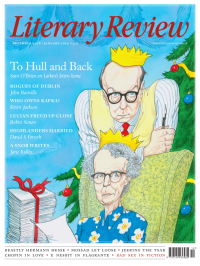Alan Ryan
From the Mayflower to Microsoft
Capitalism in America: A History
By Alan Greenspan & Adrian Wooldridge
Allen Lane 486pp £25
Capitalism in America begins with a nice device: imagine it is 1620, and you are asked to guess which part of the world will be the leading power, economically, militarily and scientifically, in the coming centuries. It’s most unlikely that you will say ‘North America’. At that time, China was more populous than Europe, while South America was richer in precious metals; North America, by contrast, was sparsely occupied by native peoples, with one or two European outposts clinging to the east coast. And yet…
As this might suggest, the book is for the most part a triumphalist history. Its heroes are the entrepreneurs and inventors who transformed the United States from a farming economy into the world’s most productive industrial society. Its guiding theme is borrowed from Joseph Schumpeter’s Capitalism, Socialism and Democracy. Schumpeter coined the phrase ‘gale of creative destruction’ to describe the process – unique, he thought, to capitalism – whereby the economy was never at rest but was constantly reinventing itself. Schumpeter believed that the process would eventually run its course and that the rise of bureaucratically managed firms would end the state of affairs whereby every successful entrepreneur is in perpetual danger of being overtaken by a competitor.
Like Schumpeter, though for very different reasons, Alan Greenspan and Adrian Wooldridge fear that the American economy has lost its dynamism. For the most part, however, the story is one of exhilarating progress. The history the authors narrate is pretty familiar, although the angle from which it is

Sign Up to our newsletter
Receive free articles, highlights from the archive, news, details of prizes, and much more.@Lit_Review
Follow Literary Review on Twitter
Twitter Feed
Although a pioneering physicist and mathematician, Blaise Pascal made it his mission to identify the divine presence in everyday life.
Costica Bradatan explores what such a figure has in common with later thinkers like Kierkegaard.
Costica Bradatan - Descartes Be Damned
Costica Bradatan: Descartes Be Damned - Blaise Pascal: The Man Who Made the Modern World by Graham Tomlin
literaryreview.co.uk
The era of dollar dominance might be coming to an end. But if not the dollar, which currency will be the backbone of the global economic system?
@HowardJDavies weighs up the alternatives.
Howard Davies - Greenbacks Down, First Editions Up
Howard Davies: Greenbacks Down, First Editions Up - Our Dollar, Your Problem: An Insider’s View of Seven Turbulent...
literaryreview.co.uk
Johannes Gutenberg cut corners at every turn when putting together his bible. How, then, did his creation achieve such renown?
@JosephHone_ investigates.
Joseph Hone - Start the Presses!
Joseph Hone: Start the Presses! - Johannes Gutenberg: A Biography in Books by Eric Marshall White
literaryreview.co.uk